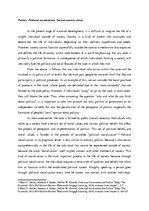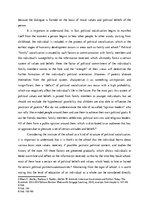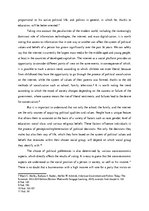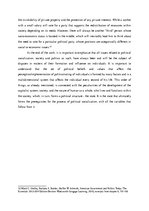The choice of political preferences is also determined by various socio-economic aspects, which directly affects the results of voting. It is easy to guess that the socio-economic aspects are understood as the social position of a person in society, as well as his income. There is no doubt that a businessman with a high income will vote for a party that insists on the inviolability of private property and the protection of any private interests. While a worker with a small salary will vote for a party that supports the redistribution of resources within society depending on its needs. However, there will always be another "third" person whose socio-economic status is located in the middle, which will inevitably lead him to think about the need to vote for a particular political party, whose positions are categorically different in social or economic issues.
At the end of the work, it is important to emphasize that all issues related to political socialization, society and politics as such, have always been and will be the subject of disputes in matters of their formation and influence on individuals. It is important to understand that the set of political beliefs and values that affect the perception/implementation of politics/voting of individuals is formed by many factors and is a multidimensional system that affects the individual every second of his life. This order of things, as already mentioned, is connected with the peculiarities of the development of the capitalist system, society, and the nature of human as a whole, who lives and functions within the society, which, in turn, forms a political structure - the state. It is the state that ultimately forms the prerequisites for the process of political socialization, with all the variables that follow from it.
…
At the present stage of mankind development, it is difficult to imagine the life of a simple individual outside of society. Society is a kind of system that structures and determines the life of individuals, depending on their abilities, capabilities and needs. However, society cannot function successfully outside the state as a mechanism that organizes and defines the life of society within state borders. It is worth emphasizing that any state is primarily a political formation, in consequence of which, individuals forming a society will inevitably face the political and social features of the state in which they live. From the above, it follows that any individual who exists within the state will be involved in its policy at all its levels. For the most part, people do not even think that they are participants in political processes. As an example of this, we can consider the banal purchase of products in the store, where goods are delivered due to the “state standards” that are formed by the state policy. However, if individuals “jump” on pit on the road, in most cases, they will blame the state. Thus, when answering the question “why and what do you think about politics”, it is important to take into account not only politics or government as an independent variable, but also the peculiarities of the perception of politics, especially the formation of people's "own" opinion about politics.




